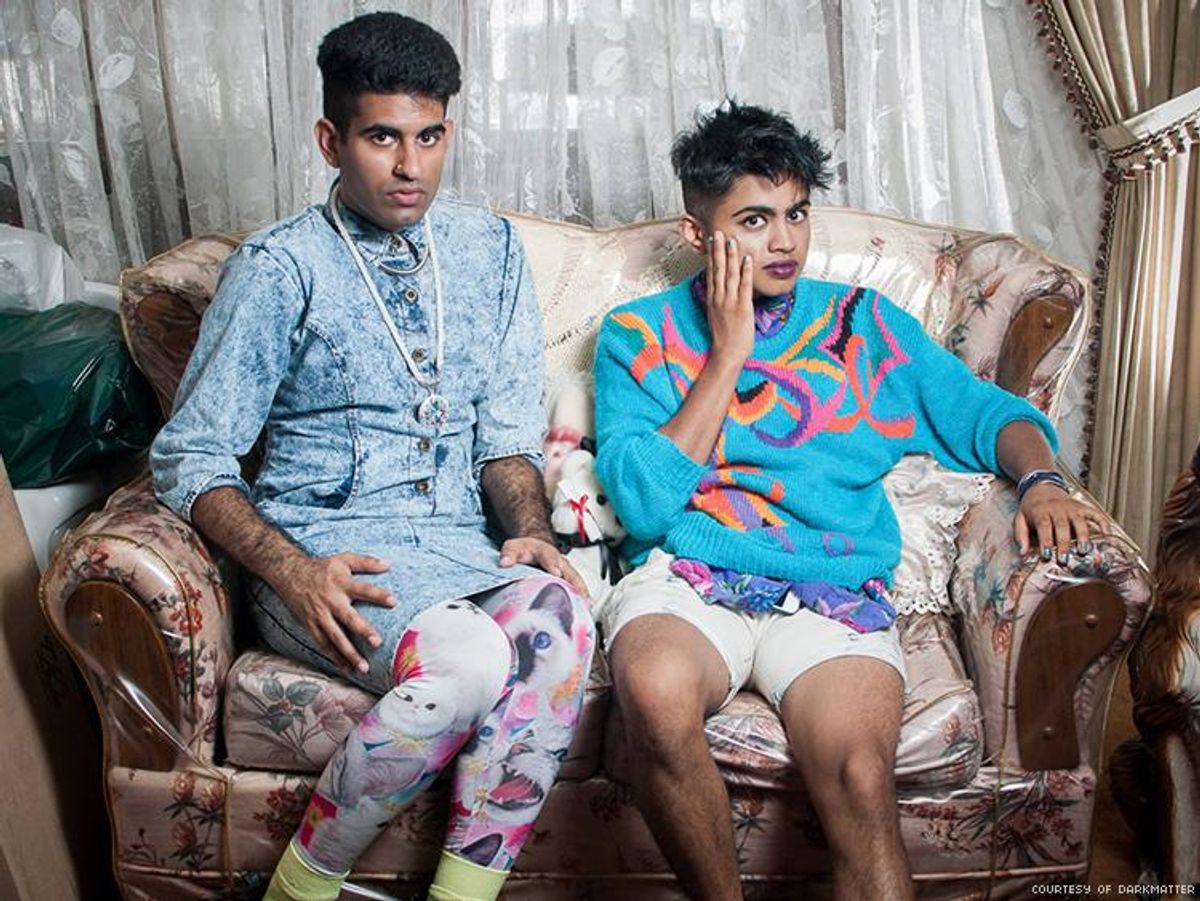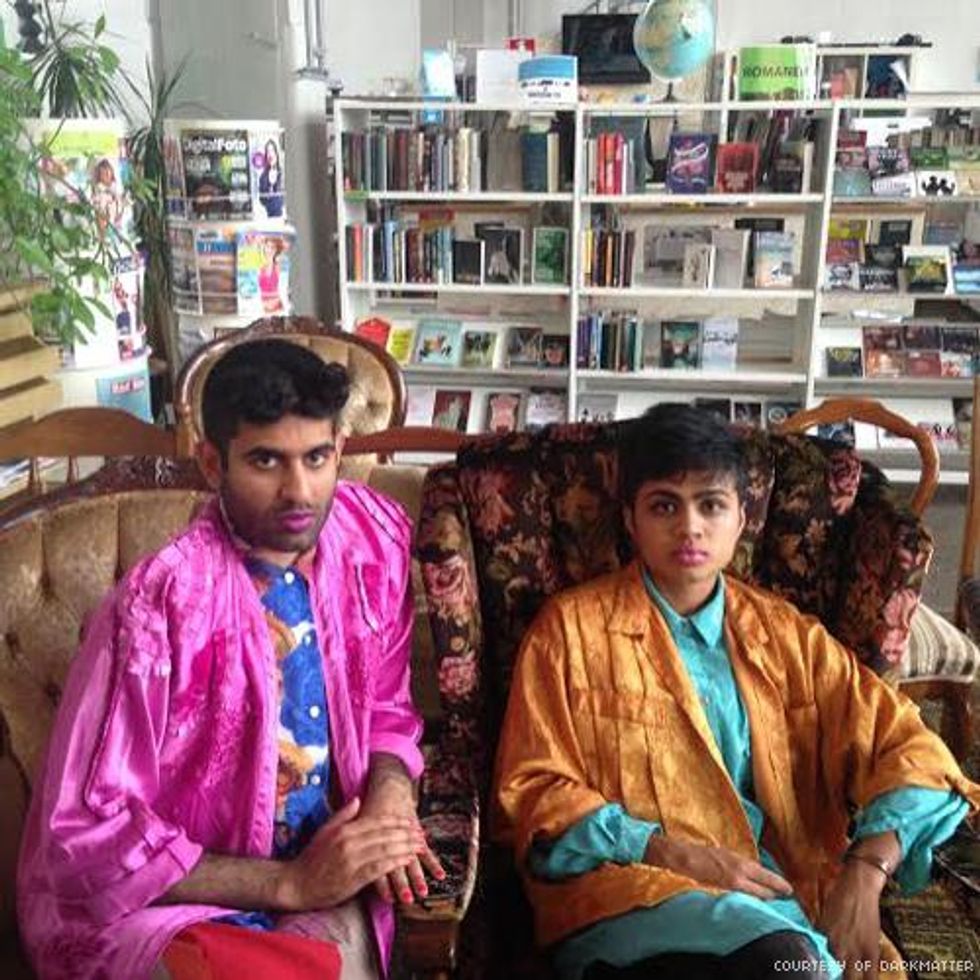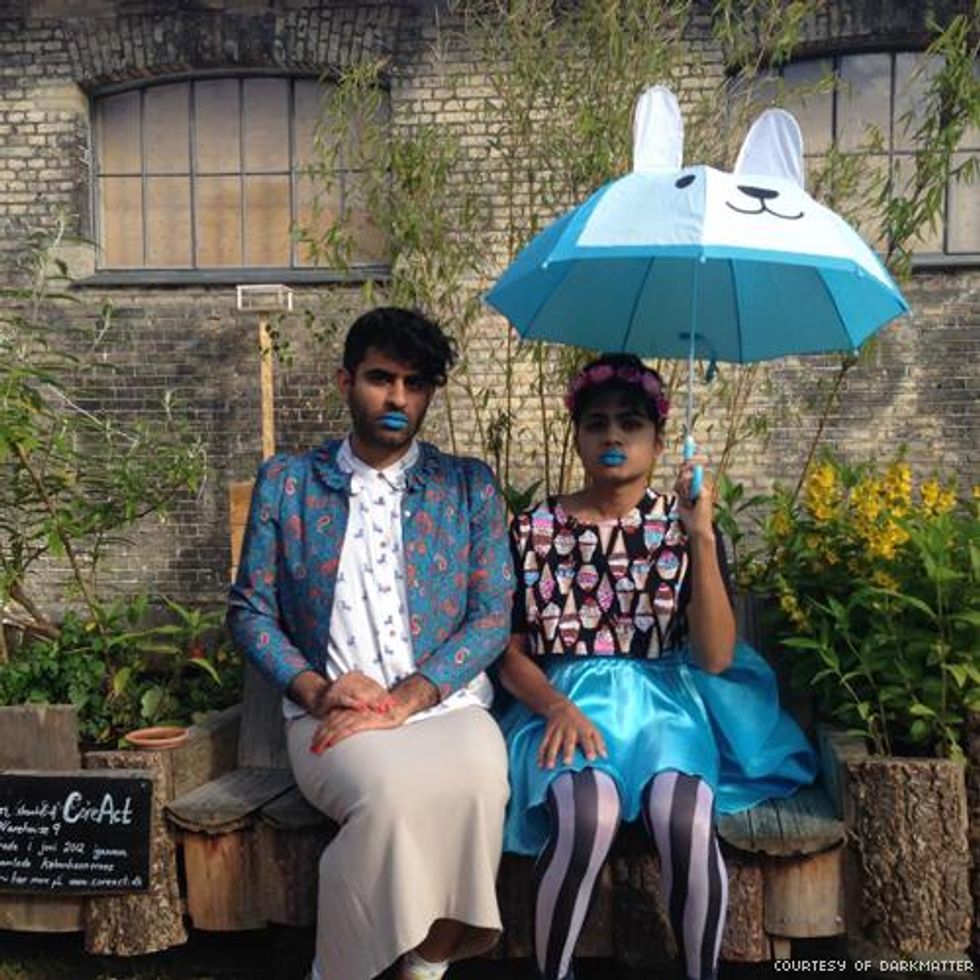The DarkMatter South Asian transgender performance poetry group is everything that Caitlyn Jenner is not. Unlike the white, Christian, Republican, upper-class, multimillionaire Olympian and reality TV star who has grabbed the lion's share of media interest about trans lives -- and made gaffe after gaffe after gaffe along the way -- DarkMatter creates radically progressive political art.
Alok Vaid-Menon and Janani Balasubramanian, the two 20-something performance poets who make up DarkMatter, regularly fill university halls and venues like New York's Public Theater on their It Gets Bitter tour. (Both poets use the pronoun "they.") Hailing from Indian-American families with Hindu roots, the two friends met in college at Stanford. The poets are so close that they often finish each other's sentences.
Biting satire is their most potent political weapon. They not only skewer the frequently anti-immigrant, warmongering, anti-LGBT platforms of conservatives. They also strike out against the arguably neoliberal politics that have backgrounded income inequality and dominated the Democratic Party for decades.
Even more radically, DarkMatter upends the sacred cows of mainstream LGBT politics with sly wordplay and sardonic humor. The name of their tour is a deliberate spoof of It Gets Better, the title of the antibullying project popularized by gay activist and advice columnist Dan Savage. DarkMatter calls its tour It Gets Bitter because, as Vaid-Menon told me in a joint interview with Balasubramanian last fall before the duo's performance at George Washington University, "when it doesn't get better, maybe that's the time to protest."
In contrast to Jenner, who is a binary transgender woman who presents herself according to society's probable expectations for an upper-class woman born in Westchester County, N.Y. -- a predominantly white enclave that contains manicured towns that number among the richest suburbs in the country -- DarkMatter's outspoken nonbinary trans identities challenge the dominant narrative of transgender lives fostered by the media in the age of I Am Cait.
With over 100,000 likes, DarkMatter's much-read Facebook page presents a rapid succession of almost daily posts espousing leftist politics that rarely receive an airing in mainstream mass media. DarkMatter speaks most to a younger generation of justifiably disaffected college-educated LGBT millennials who face a world where big-city rents have skyrocketed due to gentrification, student loan debt is exorbitant, and queer progress often seems to overlook low-income people of color whose everyday struggles against violence, unemployment, and poor access to health care seem far more dire than the battle for marriage equality. All of these issues and many more progressive topics are liberally debated on DarkMatter's Facebook feed. Here are the ways that DarkMatter inspires us.
1. They Challenge Binaries

Few things are more controversial for some trans people than DarkMatter's challenge to our most dominant narrative about trans lives. Balasubramanian reminded me that straight cisgender (non-trans) people are the true proponents of this narrative of the gender binary, or the idea that there are strict rules for presenting as male and female. But this idea also persists within the mainstream media's depiction of trans lives.
Within this narrative, trans people always seek to transition permanently from one gender to another through medical interventions like hormone therapy and gender-affirming surgery. "De-transitioning" is seen as a betrayal of one's authentic trans life. Presenting 24/7 as one's authentic gender is considered the highest form of bravery. Being either a woman or a man -- the binary poles of gender -- become endpoints in a prototypical trans journey.
In numerous Facebook posts and interviews, DarkMatter's nonbinary focus hammers at the lingering vestiges of "passing" in this narrative of contemporary trans lives. Even though trans authors like Mattilda Bernstein Sycamore have critiqued passing in their book Nobody Passes: Rejecting the Rules of Gender and Conformity, the binary gender "rules" of passing persist even when the public may know that someone is trans.
During our interview, DarkMatter talked about Jenner as a prime example of binary trans narratives. When Jenner continued to use her former first name despite coming out as trans in an April interview last year with Diane Sawyer until she debuted her look post-surgery, Jenner reenforced the gender binary, the poets say. Along with possibly delaying her first name's debut to enhance the ratings for the premiere of her reality TV show, Jenner's refusal to be called "Cait" until she received procedures like facial feminization (which she said that she underwent) showed just how much Jenner may have internalized her own problematic belief that "If you look like a man in a dress, it makes people uncomfortable. So the first thing I can do is try to present myself well. I want to dress well. I want to look good," as Jenner told Time magazine.
When we talked before their GWU performance, Vaid-Menon said that this binary narrative privileges a somewhat simplistic view of trans people as moving from pain to happiness in a way that overdetermines appearance as the dominant pathway to contentment. Vaid-Menon's words reminded me of an interview that they gave to StyleLikeU where they noted that, "So many narratives around trans people [are] that we hated ourselves when we were younger and then now we love ourselves when we are older, and that is just totally not true for so many of us because no matter how much we are comfortable in our bodies, the minute we go outside we are under attack."
"Style is extremely, extremely political," Vaid-Menon told me. Rather than being about transitioning, fashion is about transgression for Vaid-Menon and Balasubramanian. This is not to say that DarkMatter is always somber in their style. On the contrary, Balasubramanian remarked that "gender play" is important to them and exploring colorful cross-cultural attire is their way to show that rather than reaching for fixed states of "normal" everyday expression, their trans identities are about exploring their uncanny, ever-evolving uniqueness.
When they say that "style is political" Vaid-Menon also points to the fact that most trans people cannot afford expensive transitioning procedures. Access to health care for trans people remains difficult. At the same time that they mix and match feminine and masculine style, DarkMatter demands that they receive the same rights as any other trans person because, as Vaid-Menon said, "no matter what trans people look like, we are attacked," and trans equality must extend to both the gender-ambiguous and those who may look like society's expectations for men and women.
2. They Create the Ingenious

Much has been made in interviews and articles of DarkMatter's fashion sense. But their truly groundbreaking gift is poetic innovation. DarkMatter's live performances explode with a raw, visceral onslaught of political performing. At their GWU show, they recited a poem called "It Gets Bougie." Their recitation began in choric-style: they spoke at the same time in a strident, ritualistic tone, saying "Dear Dan Savage."
Then they shifted into call-and-response, answering each other as they critiqued Savage's vision. Their wit rivaled the advice columnist's own lacerating satire. DarkMatter's use of choral effects with call-and-response reminded me of the spoken word techniques of Cinque, the black gay performance poetry group consisting of Essex Hemphill, Wayson Jones, and Larry Duckette whose performances I followed in the late 1980s and '90s.
As they are performance poets, their artistry is embodied in both their delivery and their writing. Balasubramanian is small, compact, and wiry with a cool, languid vocal delivery, a wicked capacity for puns, and a terrifically twisted gift for storytelling that recalls the tales of the queer American author James Purdy and the gay Pakistani-British author Hanif Kureishi.
Vaid-Menon is tall, hirsute, lean, and robust with a hot, blistering vocal delivery, a strident, point-by-point sense of critique, and a sumptuous lyricism that recalls the poems of the queer Zoroastrian Indian poet, Hoshang Merchant, and the feminist Tamil Indian poet, Kutti Revathi.
Naming DarkMatter's older contemporaries is important because entering their sophisticated poetic world demands a journey into the art of LGBT people of color and women who have not received mainstream visibility. But while their older peers' poems and stories deal with rarified university-situated lives outside of television, film, and on-the-street activism, DarkMatter's performance poetry revels in pop culture, street style, and the cutthroat, protest-centered world of social justice activism.
"Being trans and a performer means that there's no difference between the street and the stage," Vaid-Menon told me, and they went on to say this:
"We learned early on that everything about this world is already performative. I often say that I got my performance experience from my survival. We start from a place that everything is already performative and that what we are doing in art is making that more explicit for people because there is an actual physical stage there. This allows us to do a lot of destabilizing work. A lot of the communities that we come from are often seen as already a spectacle, as strange, and so what we do is return the gaze and flip the script."
"Our lives are also about heartbreak and loneliness and family," Balasubramanian emphasized, noting that they also continually modulate the tone of the political focus in their performances by including poems about everyday realities of home, family, and love.
Yet even here, their performance poems are hardly conventional. One of their funniest, "OkCupid," (see below) is a fierce satire of queer dating, and as with all of their work, even when talking about love and sex, they can't help but be political and satirical. The poets recite the poem together, alternately between choric-style and call-and-response and, fascinatingly, they manage to integrate the politics of income inequality into a poem about hooking up online. Those eager to know how such ingenuity is possible had better check out their must-see shows.








































































Viral post saying Republicans 'have two daddies now' has MAGA hot and bothered